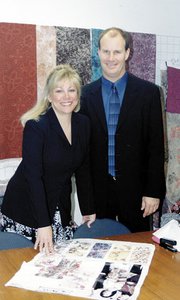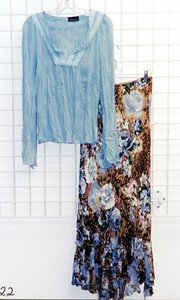Drawing on Personal Experience
In an economic climate that has made it increasingly difficult for small and midsized labels to stake a claim on retail floor space—particularly when competing with major brands—B.i.y.a.y.c.d.a. is proof that experience and a personalized touch go a long way.
President and head designer Lisa Minardo can often be spotted in her accounts’ stores, studying the misses-apparel company’s floor displays and making sure that each is in perfect order. Twice a week she visits accounts to compare sales reports from previous weeks and offer merchandising suggestions. Minardo said it’s a practice that has served her throughout her career. Indeed, it is the inspiration behind and motto of her company—“Believe in yourself and you can do anything.”
Minardo said she believes it’s that kind of personal touch that has transformed her small misses upstart into a $38-million branded apparel business.
“It’s important to interact as much as you can with buyers because they get so busy, they don’t have time to go to the stores to see how their floors look,” said Minardo. “They call me and ask me to give them feedback.”
B.i.y.a.y.c.d.a.’s positive attitude is clearly contagious among retailers— which include Robinsons-May, Dillard’s, Kohl’s, Mervyn’s and J.C. Penney—carrying the company’s 300- piece collection. Minardo said the company increased its apparel distribution by roughly 25 percent this year.
The privately held company is on an upward climb, with sales earnings up 40 percent over the same time last year. Between 1997 and 2002, the company increased its annual revenues by 50 percent year after year, according to Minardo.
“Our business’s success is from knowing who our customer is,” said Minardo. “We watch what sells at retail and build our line around what’s working.”
Retail to wholesale
Minardo, who worked for seven years as a buyer for Phoenixbased Goldwaters and Los Angeles-based Bullocks Department Stores, said that experience told her what retailers were looking for in a misses product.
Minardo’s stints in executive positions at Vernon, Calif.- based misses dress label Rabbit, Rabbit, Rabbit; Los Angeles- based manufacturer (since shuttered) Jody Apparel; and Los Angeles-based junior sportswear maker Young Edwardian were a crash course for running her own business.
“There’s not an area in apparel manufacturing that I haven’t been involved in,” said Minardo. “I’ve learned to have a sense of urgency and react quickly to the needs of a retailer. We run our manufacturing business like a retailer. The key is to know how to react when something sells quickly.”
In the mid-1990s, Minardo started her own company with husband and business partner Jeff Mahowald.
Minardo heads up the company’s design, merchandising and sourcing; Mahowald is in charge of production and distribution. Together they bring 22 years of industry experience to the table, which has served them well during challenging times.
The company was initially geared toward the junior market, said Minardo, who quickly discovered its quick pace and heavy demands were not compatible with her vision for the company. She changed direction and came up with a fun and youthful collection geared toward the misses market.
The company’s acronym is printed on hangtags, which are then sewn into thousands of petites, misses and plus-sized apparel items each season. Each category is offered in the company’s five divisions: B.i.y.a.y.c.d.a., the sportswear collection; J’Croix, a women’s better contemporary line; Believe, a dress line; and Meghan Mathews and Meghan Elisse, which Minardo calls floating- budget labels.
Each label uses soft fabrics, subtle lace insets and layered silhouettes for its signature looks. And each line offers its own interpretation of today’s misses trends: paisley and floral georgette tunics in chiffon and lace, tunic blouses with broomstick pleating, and brightly colored or muted crinklecotton skirts and pants.
A portion of the company’s apparel is produced at a small factory near downtown Los Angeles, which has the capacity to produce quick-turnover items.
However, the company recently decided to move the bulk of its production to Guatemala and the Philippines.
“It’s difficult to meet the lower price points offered by those who produce overseas and still come out ahead,” she said, adding that the company wants to keep its apparel prices between $12 and $36 wholesale.
Minardo said she hopes the B.i.y.a.y.c.d.a. collections—and her personal merchandising efforts—will help break through the cycle of sameness on the sales floor.
“Some buyers want to do the same old thing and stay in that cycle instead of attempting to try something new,” she said. “I just keep pushing and pushing and pushing. The more we get our product in the stores and expose customers to it, then perhaps buyers will test us.”























